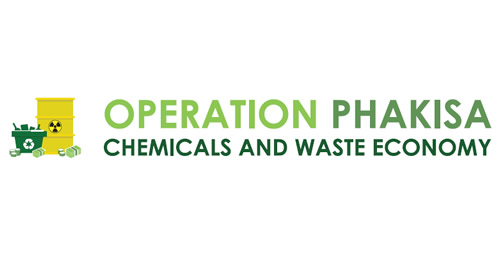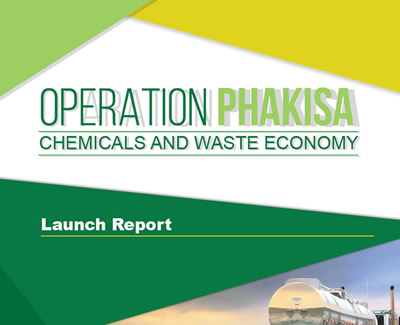Background
Department of Environmental Affairs together with the Department of Planning, Monitoring and Evaluation initiated a Chemicals and Waste Phakisa programme from 24 July to 24 August 2017. Chemicals and Waste Phakisa was aimed at engaging on opportunities that call lead to reduction of impact on the environment, while growing the GDP contribution and creating jobs. The Departments intended to have an intensive consultative process involving all the relevant stakeholders to define ambitious target and identify ideas to reach them and come out with clear detailed 3 feet plans to achieve proposals with defined timelines and committed budget and legal support. The implementation of the outcomes is intended to be a collaborative effort by government and stakeholders.
The followed 5 weeks of discussion in different labs held from 24 July to 24 August 2017 and attended by local, provincial and national government and their relevant agencies, business, Non-Government Organisations, Academia, Research institutions including higher learning institutions. On completion of the Chemicals and Waste Phakisa programme, the Department of Environmental Affairs invited businesses, private sector, individuals, entrepreneurs, cooperatives and NGOs to pledge their intention to participate in the Thuma Mina Campaigns named after the call by the president in his maiden State of The Nation Address where he called everyone to participate input towards change in South Africa
Key objectives of Chemicals and Waste Phakisa
During the programme, there were four waste streams namely, Municipal Waste, Bulk Industrial waste, Product Design and Waste Minimization and Chemicals. The groups deliberated on initiatives and came up with 3 feet plans and proposals for budgets with implementation strategy.
The key aspirations in each group were as follows:
- Reduce the negative environmental and health impact of waste and risks posed by chemicals;
- Increase commercialization of the circular economy and create value from resources currently discarded as waste;
- Foster inclusive growth through positioning of South Africa as a globally competitive producer of sustainable products.
The Minister of Environmental Affairs and the President together with the Premier of the Eastern Cape Province agreed to launch the outcomes of the chemicals and waste economy together with the Good Green Deeds Programme.
The Launch
The launching of Chemicals and Waste Phakisa coincided with the Good Green Deeds Programme a ground-breaking initiative that seeks to mobilize all sectors of South Africa to become more environmentally conscious, leading a deal for nature. The Good Green Deeds campaign seeks to change people’s attitudes, behaviors towards responsible management of waste, and keeping their neighborhoods clean, green and safe.
The objective for the Good Green Deeds Programme is a positive drive towards a clean South Africa which is free of litter and illegal dumping. This is a nationwide environmental programme that proposes a simple but bold blueprint for what we all can do as individuals, organisations, communities and as a nation to bring about the realization of a cleaner and more environmentally presentable country. More emphasis is required in ensuring that the citizens now take a stand against the litter in their neighborhoods and start to clean-up their areas.
Media related products
Launch Report
The president arrived at the East London Convention Centre accompanied by Minister of Cooperative Governance. He was received by Minister of Environmental Affairs and the Director General, Nosipho Ngcaba. The Director General took the opportunity to appreciate everyone who attended and took the president through all waste streams and followed by short presentations by Phakisa Lab leaders on the workstreams.
» more
Lab outcomes report
The Phakisa addresses the opportunity to enhance South Africa’s Chemicals and Waste Economy. The Chemicals and Waste sector has a critical role in the economy and the lab aspirations were as follows:
- Reduce the negative environmental and health impact of waste and risks posed by chemicals.
- Increase commercialisation of the circular economyand create value from resources currently discarded as waste.
- Foster inclusive growththrough positioning of South Africa as a globally competitive producer of sustainable products.




